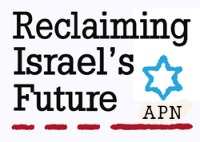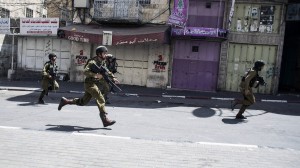Reclaiming Israel's Future: Week 2 - Hard Truths; Take Action; Resources & Learn More
Israeli Prime Minister Benjamin Netanyahu is getting a raw deal. That’s the line being peddled by Elliot Abrams, who has emerged in recent months as one of the staunchest U.S. defenders of Netanyahu’s settlement policy. Rather than bury Netanyahu with criticism for expanding settlements, Abrams argue, the world should praise him for his unrecognized settlement restraint. The facts, Abrams insists, tell the story – facts that Abrams cherry-picks and spins to build a case that is pure fiction.
--Peace Now Secretary General reacts to government decision in wake of kidnapping to transfer millions of shekels to settlements without any designation of objectives.**
Jerusalem: What You Can Do
YOU can help reclaim Israel's future in Jerusalem. Here are actions you can take right now:
-
Spread the word. Two of the greatest obstacles to changing Israeli policies are apathy and ignorance.
Challenge both. Here are some easy ways:
- Don't miss Thursday's briefing call with Jerusalem expert Danny Seidemann, on Thursday, June 26th at 3:45pm Eastern Time. Details here.
- Share Facts on the Ground: APN’s Map App on Facebook and Twitter.
- Send your friends the Jerusalem chapter from APN’s landmark publication, “They Say, We Say”.
- Post and send out APN’s "Danny Seidemann: Why E-1 matters" video filmed last winter during APN's Israel Study Tour (below).
- Read and share APN's Top 10 Myths about Jerusalem from 2010 (sadly, little has changed).
Return to the Main "Jerusalem" Page

On the second week of our Reclaiming Israel’s
Future campaign, Mr. Seidemann will help us address the theme of the week: Jerusalem. He will discuss the
latest developments on the ground in East Jerusalem, examine the situation on the ground 47 years after the Six Day
War, and address the future of Jerusalem.
Hard Truths About Jerusalem
Some Hard Truths about Jerusalem…
- Jerusalem is of central importance to Israelis and Jews everywhere. It is a city that throughout history has been the focal point of Jewish collective yearning and collective identity. The Jewish return to the Old City and its holy sites after 1967 was the fulfillment of this yearning. No one can deny or undermine the Jewish connection to Jerusalem. Jerusalem is and will forever be the capital of Israel.
- Jerusalem is also a city that has deep political, historical, economic, and cultural significance to Palestinians, and deep religious importance not only for Jews, but for Christians and Muslims everywhere.
- Jerusalem is already a divided city. One-third of its population is Palestinian, in addition to large Palestinian urban areas lying just beyond the municipal border. The patterns of life in the city disclose two distinct populations - Israelis and Palestinians - living separate and rarely overlapping existences.
- Jerusalem must be re-fashioned as two capitals for two states. No resolution to the Israeli-Palestinian or Israel-Arab conflicts is possible without compromise on Jerusalem. Refusal to negotiate in good faith over the future of Jerusalem will mean the loss of the two-state solution. Settlements in East Jerusalem are and have always been about only one thing: cementing Israel’s hold on the land in order to prevent the emergence of a Palestinian capital in the city. After 47 years, a two-state solution is still possible in Jerusalem, but barely.
- If political obstinacy and extremism are allowed to stand in the way of compromise, or if settlement-related developments continue and succeed in taking Jerusalem off the negotiating table, it will mean the end of the two-state solution. Loss of the two-state solution directly threatens Israel’s viability as a democracy and a Jewish state.
- The current borders of Jerusalem have no historical or religious meaning. Shortly after the 1967 War, Israel annexed large areas of land, including a number of Arab towns and villages, to expand Jerusalem. There is nothing sacred about these borders, either to Israel or to Jews. The emergence of a Palestinian capital in Arab areas of Jerusalem, along with a special regime or special arrangements for the Old City and its surrounding area – would not undermine Israel's claim to Jerusalem as its capital. Rather, it would clear the way for international recognition of Jewish Jerusalem as Israel's capital.
- For the sake of Israel's security and stability – and for the health and stability of this remarkable city – a formula must be found to share Jerusalem between Israelis and Palestinians, and between Jews, Muslims, and Christians. Pragmatic, creative solutions exist to satisfy competing claims to Jerusalem and its holy sites; what is needed is the leadership, courage, and goodwill to explore them. Most of the proposed solutions for Jerusalem's future would put Arab neighborhoods under Palestinian control, while Jewish neighborhoods would remain under Israeli control. These arrangements would make Israel's capital a more Jewish city and would allow Israel to shed the burden of ruling over Palestinians, while guaranteeing Jewish access to holy sites.
Don't miss our briefing call with Jerusalem expert Danny Seidemann or with Daniel Seidemann and APN's Lara Friedman regarding the tension in Jerusalem in 2014.
Return to the Main "Jerusalem" Page
--Former MK, speaker of the Knesset and former director of the Jewish Agency says all of Palestinian society is kidnapped by Israel.**
--Bill to force-feed hunger-striking Palestinian detainees rushed through first reading.**
Vox: The end of 'both sides'
 Israel's occupation of the West Bank is indefensible
Israel's occupation of the West Bank is indefensible
by Max Fisher
There is a pleasant fiction in the United States and parts of Israel that the Israel-Palestine conflict exists in a sort of suspended animation, on pause and simply awaiting diplomatic resolution. But the truth is that the conflict, which over the decades has included several wars, countless terrorist attacks, and two Palestinian uprisings, never really goes away for most of the 12 million people in Israel and the Palestinian territories. And periodically it will escalate so rapidly, with such relatively slight provocation, and to such a level of severity, that the rest of us can't ignore what every Palestinian and many Israelis already know: the conflict may be quieter today than in the past, but it is still active, still destroying lives and communities, still scarring these two societies, every day.